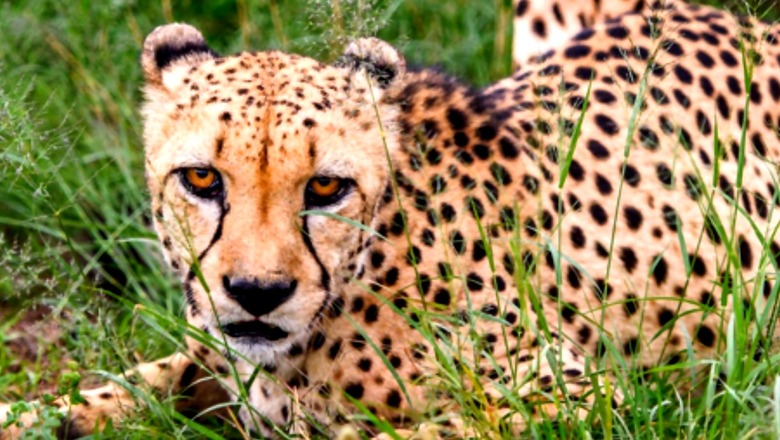In Customised Jumbo Jet, 8 Wild Cheetahs from Namibia are Coming to India for Historic Translocation

views
Eight Namibian cheetahs will board an overnight flight to Jaipur only to be re-introduced to the Indian territory after the wild cats faced extinction in the 1950s. A passenger B747 Jumbo Set has been customised specially to accommodate the five female and three male cheetahs who will together form the founder population of the elusive wild cat at Madhya Pradesh’s Kuno National Park.
The animals would be secured in cages, which will be kept in the main cabin of the aircraft, and veterinary staff would be allowed to have full access to the cats during the flight. The aircraft is an ultra-long range jet capable of flying up to 16 hours, so it can fly directly from Namibia to India without a stop to refuel, an important consideration for the well-being of the cheetah.
A team of eight officials from both India and Namibia will oversee the entire mission.
The flight is expected to reach Jaipur on the morning of September 17 from where the animals would be transported to MP in helicopters in an hour-long journey.
According to authorities, the decision of an overnight journey was taken to ensure that the animals travel during the coolest hours of the day. The transcontinental mission marks the first time a wild southern African cheetah will be introduced in India, or in Asia, or on any another continent.
Countdown Begins
At Kuno, the countdown has already begun, and preparations are in full swing. The staff has already been trained, and large predators have been moved away. Once the cheetahs land, they would be readied for a soft release on the same day by Prime Minister Narendra Modi.
A soft release would mean the animals would be kept in small quarantine enclosures for at least 30 days. A 6 km 2 predator-proof holding capacity has already been readied with nine separate compartments.
In order to ensure complete surveillance, the animals have been radio collared, and they would be physically monitored, once they are out of soft enclosures, to ensure they are able to hunt normally. They have already been vaccinated, and their health would be assessed once again prior to the flight take-off.
The authorities have also removed invasive plant species (jungle keekar) from the designated areas, and assessed the prey and predator population. The national park is home to chital, sambar, nilgai, wild pig, chowsingha, peafowl, hare and feral cattles – common prey for cheetahs.
Unique Scientific Expedition
The mission has been designated as a ‘Flagged Expedition’ by US-based The Explorers Club. Captain Hamish Harding, Chairman of Action Aviation, which arranged the customised Boeing 747-400 aircraft for the mission, and Cheetah Conservation Fund (CCF) founder and executive director, Dr Laurie Marker, both club members, will be carrying Explorers Club Flag number 118 on the mission. The flag will be archived at club headquarters in New York City along with documentation detailing the scientific expedition.
Project Cheetah
Formally proposed in 2009, Project Cheetah was finally given a go ahead by the Supreme Court in 2020 as a pilot programme to reintroduce the species in India. While India had signed the Memorandum of Understanding (MoU) with Namibia in July for the translocation of first set of cheetah, another one with South Africa is yet to be signed. Once that is formalised, another set of around 12 African cheetahs would then be brought to India.
India hopes to bring at least 5-6 cheetahs every year till the holding capacity of the park is reached and a founder population is established. It is significant to note that the success of the mission will only be determined in coming years, once the animals adapt to the new habitat, hunt on their own, and procreate.
“The cheetahs on this flight are not just the founders of a new population, but explorers and goodwill ambassadors for an entire species,” said Union Minister for Environment, Forest & Climate Change Dr Bhupender Yadav. He further said the project will bring in resources to restore neglected habitats and conserve their biodiversity, harness their ecosystem services and their ability to sequester carbon to their maximum potential.
The government is also hoping the arrival of cheetahs would give a boost to ecotourism in the state, and help local communities in strengthening their livelihood options.
Read all the Latest News India and Breaking News here




















Comments
0 comment